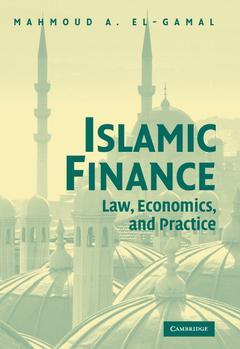Description
Islamic Finance
Law, Economics, and Practice
Author: El-Gamal Mahmoud A.
This book provides an overview of the practice of Islamic finance.
Language: English
Subject for Islamic Finance:
Approximative price 85.89 €
Subject to availability at the publisher.
Add to cart
Islamic finance: law, economics, and practice
Publication date: 07-2006
240 p. · 15.9x23.4 cm · Hardback
Publication date: 07-2006
240 p. · 15.9x23.4 cm · Hardback
Approximative price 35.19 €
Subject to availability at the publisher.
Add to cart
Islamic finance: law, economics & practice
Publication date: 11-2008
240 p. · 15.3x22.8 cm · Paperback
Publication date: 11-2008
240 p. · 15.3x22.8 cm · Paperback
Description
/li>Contents
/li>Biography
/li>
This book provides an overview of the practice of Islamic finance and the historical roots that define its modes of operation. The focus of the book is analytical and forward-looking. It shows that Islamic finance exists mainly as a form of rent-seeking legal-arbitrage. In every aspect of finance - from personal loans to investment banking, and from market structure to corporate governance - Islamic finance aims to replicate in Islamic forms the substantive functions of contemporary financial instruments, markets, and institutions. By attempting to replicate the substance of contemporary financial practice using pre-modern contract forms, Islamic finance has arguably failed to serve the objectives of Islamic law. This book proposes refocusing Islamic finance on substance rather than form. This approach would entail abandoning the paradigm of 'Islamization' of every financial practice. It would also entail reorienting the brand-name of Islamic finance to emphasize issues of community banking, micro-finance, and socially responsible investment.
1. Introduction; 2. Jurisprudence and arbitrage; 3. Two major prohibitions: Riba and Gharar; 4. Sale-based Islamic finance; 5. Derivative-like sales: Salam, Istisma' and 'Urbun; 6. Leasing, securitization and Sukuk; 7. Partnerships and equity investment; 8. Islamic financial institutions; 9. Governance and regulatory solutions in mutuality; 10. Beyond Shari'a arbitrage; Conclusion.
Mahmoud A. El-Gamal is Professor of Economics and Statistics at Rice University, where he holds the endowed Chair in Islamic Economics, Finance, and Management. Professor El-Gamal has also served in the Middle East Department of the International Monetary Fund (1995–6), and was the first Scholar in Residence on Islamic Finance at the U.S. Department of the Treasury in 2004. He has published extensively in the areas of econometrics, finance, experimental economics, and Islamic law and finance.
© 2024 LAVOISIER S.A.S.




